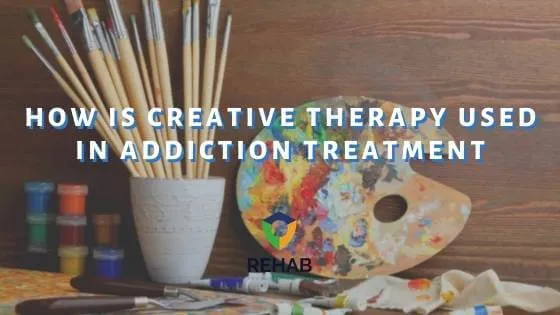Table of Contents
Recovering from addiction often causes an array of overwhelming and uncomfortable emotions. For example, feelings of fear, shame, regret, and other trauma-related emotions are very powerful. These feelings and emotions can become difficult to cope with, causing early recovery to be a difficult time for many individuals. However, once a person gets to a point where they are in touch with these emotions, they can begin to heal – with the help of professional treatment.
Creative therapy offers individuals a safe space to become in touch with their emotions, process them, and heal from them. To explain, creative therapies typically include art, music, and drama therapy. Let’s take a look at what creative therapy is and how it benefits addiction treatment.
What is Creative Arts Therapy?
Creative therapy involves individuals engaging in the arts to address mental, emotional, and behavioral disorders.[1] This is an extremely common practice among addiction treatment centers, especially for dual-diagnosis patients. By focusing on creative expression, licensed creative arts therapists (LCATs) support patients as they work through their feelings and thoughts. Oftentimes, patients may not know how to verbally express their feelings, however, creative arts therapy helps correct this.
Creative arts therapy is an umbrella term that encompasses several modalities of psychotherapy. These may include art therapy, music therapy, dance therapy, drama therapy, and poetry therapy. In addiction treatment, these therapies are utilized to help a person find a space that feels safe to explore their emotions, thoughts, and behaviors. As a result, patients harness self-awareness through personal discovery, creativity, and reflection. One of the many goals of creative therapy in addiction treatment is to establish effective problem-solving skills and healing through both verbal and non-verbal communication or creative avenues.
Creative Therapy in an Addiction Treatment Setting
Reputable addiction treatment centers follow evidence-based, patient-focused practices. Typically, a program will include integrating multiple group therapies – such as traditional talk therapy and creative arts therapies – into a treatment plan that focuses on treating addiction and any trauma that led to or resulted from addiction.
While many treatment centers may consider creative arts therapies alternative options, other programs consider them a fundamental part of treatment due to their beneficial nature. Creative therapy works alongside traditional talk therapy to ensure that patients are prepared for long-term sobriety and success.
This integrated approach allows addiction therapists to break down barriers, creating self-reflection, and healing. Additionally, this form of therapy allows individuals to develop an understanding of emotions and behaviors. As a result, patients are provided with the tools needed to effectively handle high-risk scenarios.
Types of Creative Arts Therapies
Creative arts therapy includes the therapeutic practice of many different types of art. These art therapies are integrated into a traditional addiction treatment program to accentuate healing and emotional well-being. Let’s take a look at the most common types of creative therapy that are used in addiction treatment.
Art Therapy
Art therapy is perhaps the most well-known modality of creative therapies. Patients often feel most comfortable with this approach, as they are able to focus on one piece of artwork. These sessions may focus on concepts like drawing what their road to recovery looks like, painting a particularly impactful moment in their journey, or expressing feelings of trauma through art. In other words, art therapy is an impactful form of trauma therapy. This is extremely beneficial for individuals who have a hard time vocally expressing their emotions and struggles, as it allows them to draw, paint, and even sculpt instead.
Music Therapy
Music therapy is an evidence-based use of music to address one’s thoughts, emotions, and behaviors during addiction treatment. Music therapy is particularly impactful in opening the doors to a patient being able to vocalize their emotions and thoughts.[2] Session activities may involve lyrical analysis, drum circles, vocalization, and even songwriting.
Dance Therapy
Dance therapy, also known as movement therapy, leverages the psychotherapeutic use of movement and dance. This helps to provide support on all levels – mentally, emotionally, functionally, spiritually, and socially. Additionally, dance therapy looks at the correlation between movement and emotion, while sessions often include movement mirroring and analysis. This is all tied to the patient’s relationship to the body and substance use.
Drama Therapy
Drama therapy is another opportunity for recovering individuals to establish comfort in speaking about the emotions and thoughts that were driving their addictive behaviors. With sessions focusing on scriptwriting and role-playing, patients are able to examine things like their role in life, family structures, and social circles. Additionally, this allows individuals to look at their trauma from a subjective stance, rather than reliving it from a first-person perspective. This allows patients to address their trauma without dealing with difficult mental and emotional pain.
Poetry Therapy
Like other creative art therapy modalities, each poetry therapy session will take a unique path. However, sessions may include introducing a poem, reading it aloud, moving into poem analysis, and relating it back to the individual’s own recovery journey. This is also another great way to process addiction-related trauma, as it puts traumatic situations into different perspectives.
Finding Creative Therapy for Addiction Recovery
When you or your loved one is in need of addiction treatment, your course of recovery should be completely centered around you and your needs. At Rehab Recovery Centers, we are here to help guide you along the process of finding a rehab in your state. If you are looking for a space for self-recovery using evidence-based techniques, contact us today.
References:
Get Help Today
Don’t go through the process of recovery alone. There are people who can help you with the struggle you’re facing. Get in touch with one today.


